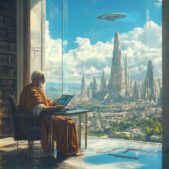History of the dystopia genre in literature
Recently, works such as The Hunger Games have created a huge furor in society, especially among those members who are interested in dystopia books. But we’ve read dystopias quite often before, and besides, they weren’t all as technologically advanced as the aforementioned book. More often than not, they are about enslaved societies, socially oppressed circles of people. One of the most famous examples of such a novel of dystopia is considered to be George Orwell’s 1984, which gave life to the winged expression “Big Brother is watching you,” thus embodying life under a microscope. A similar story load can be found in The Hunger Games, which broadcasts to the masses the attempts of some people to kill others. But the literature of dystopia has not always sought such modernization: television and computers are merely the newest additions to the genre. In fact, the roots of this trend go back to the beginning of the 16th century, when Thomas More wrote a book called Utopia, which, paradoxically, described a society very far removed in structure from its name. In general, writers who create in this genre, in the concept of dystopia, first of all, put the meaning of a certain society, split and destroyed by social norms and attitudes.
Anti-utopia is a kind of society with perfect ideals by design, but fallen and destroyed in fact. Anti-utopia shows a nightmarish picture of the near future. Typical themes of dystopia usually involve rebellion, social pressure, revolutions, wars, overpopulation, and catastrophe. Many consider this genre relatively new in literature, but the reality is that it has a very long and fascinating history. You will find evidence of this in this brief excursion into the history of the dystopia genre.
Functions of the dystopia
Through the novel of the dystopia, the author demonstrates his own conviction concerning the problems of humanity and society, and warns people of their weakness. Writers usually resort to the genre of dystopia to discuss reality and portray problems that are very likely in the future. Although the role of the dystopia in literature is limited to educating and warning the audience, do not underestimate its influence in highlighting problems of pressing social, political, and governmental concern.
The structure of dystopias
Background: A dystopia is usually part of a fictional universe that tells the story of how this world was formed or how it has evolved (or degenerated) in relation to our society. Prehistory vividly demonstrates the process of shifting levers of control over society, changing social norms, or the emergence of government power, run by individual corporations, totalitarian dictators, or bureaucrats.
Main Character: There are several types of protagonist who may appear in a dystopia book. One of these is the character who intuitively senses society’s problems and tries to fix them, openly believing that throwing the dictator off the Olympus of power is indeed possible. Often the worldview of such a character is shaped by his environment, which also is not indifferent to confrontation with the holder of power.
The other type of protagonist is an integral part of a society that perceives itself as nothing less than utopian, but at a certain point he realizes how wrong this very society is, and attempts to change or destroy it.
The plot: often the protagonist meets a character endowed with anti-utopian traits, perhaps the leader of the whole society. A conflict occurs in which the protagonist also meets, or is supported by, a group of people driven by the idea of destroying the dystopia. Sometimes these people were previously part of this dystopia, but they have managed to come to their senses and shed this burden.
The climax: In the novel of the dystopia, the problem often remains unsolved; in most cases, attempts to destroy the dystopia are in vain. Sometimes the hero manages to break the vicious circle and break free, but in the overwhelming majority of cases the protagonist (or the group of people we spoke about above) is defeated and the dystopia continues.


